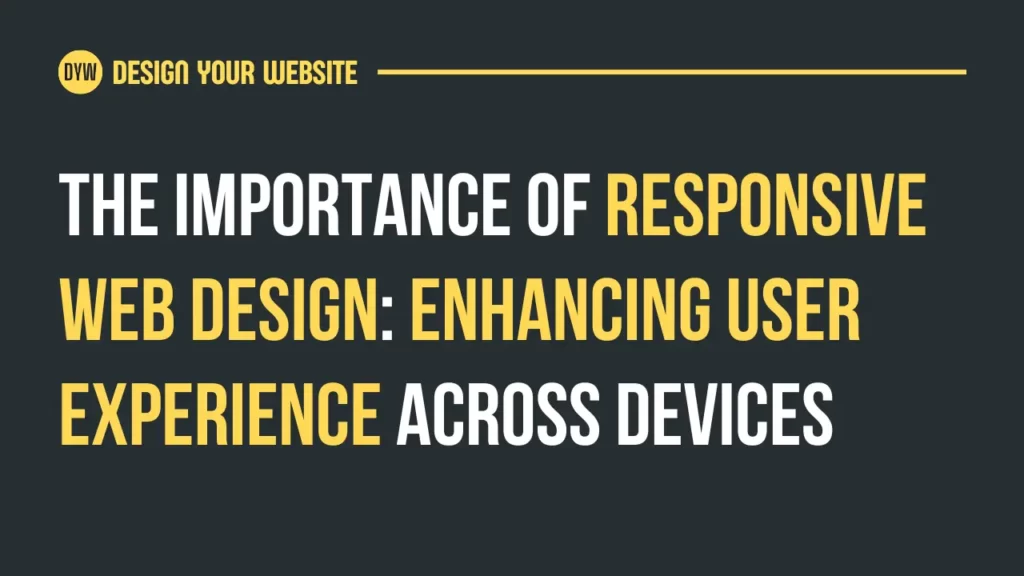Responsive Web Design
In today’s digital landscape, where users access websites through various devices, responsive web design has emerged as a crucial aspect of creating a successful online presence. With smartphones, tablets, and other mobile devices becoming the primary means of accessing the internet, it is essential for businesses to adapt their websites to different screen sizes and resolutions. In this blog post, we will explore the importance of responsive web design and how it enhances user experience across devices.
What is Responsive Web Design?
Responsive web design is an approach to web development that aims to create websites that automatically adapt and respond to the user’s device, whether it is a desktop computer, a tablet, or a smartphone. By utilizing flexible layouts, proportion-based grids, and media queries, responsive websites ensure that the content, images, and overall design are optimized for each screen size.
- Improved User Experience
One of the primary benefits of responsive web design is its ability to enhance user experience across devices. With a responsive website, users no longer need to zoom in or scroll horizontally to view content, as it automatically adjusts to fit their screens. This seamless experience keeps visitors engaged and encourages them to explore your website further. - Higher Mobile Traffic and Conversions
With the exponential growth of mobile devices, having a mobile-friendly website is no longer optional. Responsive web design enables your site to cater to the increasing number of mobile users, resulting in higher mobile traffic. Additionally, responsive websites have better conversion rates as users are more likely to make a purchase or complete desired actions when the site is easy to navigate and visually appealing on their device. - Cost and Time Efficiency
Having a separate mobile version of your website can be time-consuming and costly to maintain. With responsive web design, you eliminate the need for multiple versions, as your website adjusts dynamically to different devices. This saves both time and resources, allowing you to focus on other important aspects of your business. - Improved SEO Performance
Responsive web design plays a significant role in search engine optimization (SEO). Search engines, like Google, prioritize mobile-friendly websites in their search results. By having a responsive website, you improve your chances of ranking higher in search engine results pages (SERPs). Furthermore, a single URL for both desktop and mobile versions of your site makes it easier for search engines to crawl and index your content, positively impacting your SEO efforts. - Future-Proof Solution
The digital landscape is constantly evolving, with new devices and screen sizes being introduced regularly. By adopting responsive web design, you future-proof your website, ensuring that it remains adaptable and accessible to users across all devices. This flexibility allows your business to stay ahead of the curve and provide a seamless user experience regardless of technological advancements.
Conclusion
In a world where user experience and mobile accessibility are paramount, responsive web design has become a crucial factor in achieving online success. By optimizing your website for different devices, you can deliver a seamless browsing experience, improve your search engine rankings, and drive business growth. Embrace the power of responsive design and elevate your digital presence to meet the evolving needs of today’s users.
Remember, investing in responsive web design is an investment in your business’s future. Stay ahead of the curve, adapt to changing technology, and provide a delightful user experience that keeps your audience engaged and coming back for more.
FAQs
Q1. Will responsive web design affect my website’s loading speed?
A: Responsive web design, when implemented correctly, should not significantly impact your website’s loading speed. In fact, a well-optimized responsive website can improve loading times by reducing the need for unnecessary server requests and optimizing images for different devices.
Q2. Can I make my existing website responsive?
A: Yes, it is possible to make an existing website responsive. However, the process may vary depending on the complexity of your site. It is recommended to consult with a professional web developer who specializes in responsive design to ensure a smooth transition.
Q3. Is responsive web design only important for mobile devices?
A: While mobile devices are a significant driving force behind the need for responsive design, it is not limited to mobile devices alone. Responsive web design ensures a consistent and optimized experience across all devices, including desktop computers, tablets, and various screen sizes.
Q4. How do I test if my website is responsive?
A: There are several tools




